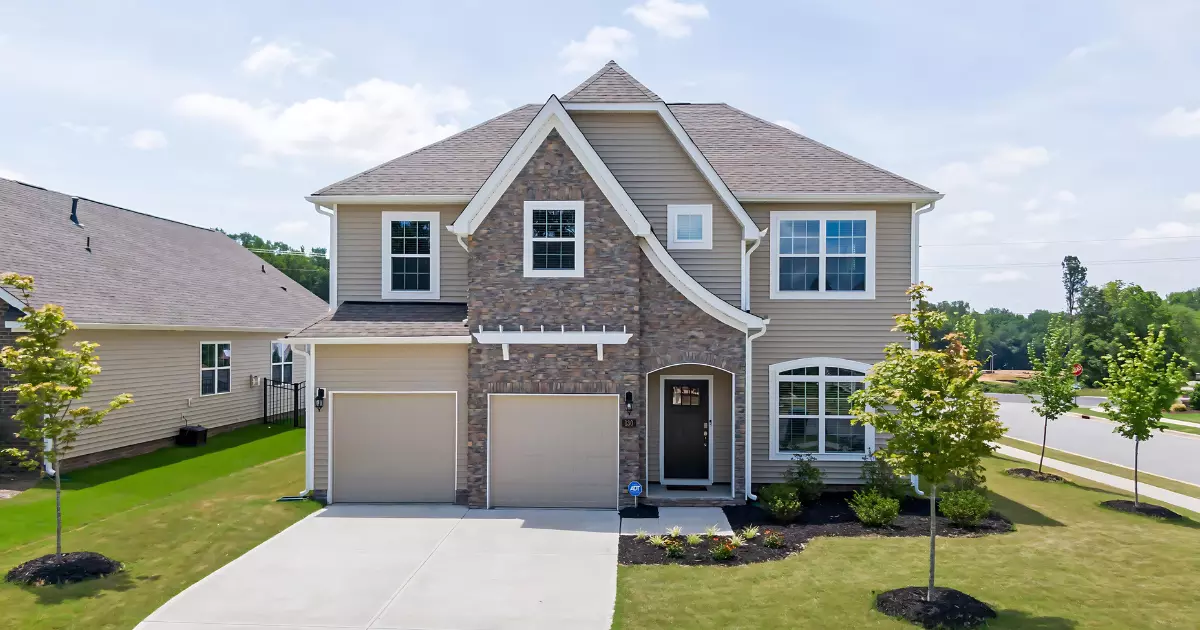Unlocking the secrets to buying your dream home can be a game-changer. This guide offers practical tips and expert advice to help you find the perfect residential property. Whether you’re a first-time buyer or looking to upgrade, these insider insights will empower you. Avoid common pitfalls, discover hidden gems, and learn what truly matters in a home purchase. Ready to take the first step toward owning your dream home? Keep reading for the essential strategies and tips that will turn your real estate dreams into reality.
What is A Residential Property?
A residential property is a type of real estate used primarily for living purposes. This includes single-family homes, condominiums, townhouses, and multi-family units like duplexes and apartment buildings. These properties are designed primarily for residential purposes. They provide living spaces for individuals and families, by offering essential amenities such as bedrooms, bathrooms, kitchens, and living areas. Unlike industrial or commercial properties, residential properties focus on comfort and personal living space. They vary in size, style, and location, catering to diverse preferences and needs. The primary goal of residential properties is to provide a safe, comfortable, and functional living environment for their occupants.

What are The Types of Residential Properties?
When it comes to choosing a place to call home, there are various types of residential properties available. Each type offers unique features and benefits. Understanding their differences can help you make an informed decision based on your lifestyle, needs, and preferences. Let’s explore the main types of properties and what each has to offer.

Single-Family Homes
Single-family homes are standalone houses designed for one family. They typically offer more privacy, space, and control over the property compared to other types of residential properties. These homes often come with a yard, garage, and multiple bedrooms. This makes them ideal for families who need room to grow. Owners have the freedom to modify and renovate as they please, which adds to the appeal.
Condos
Condos, or condominiums, are individual units within a larger building or complex. Owners share common areas such as gyms, pools, and lobbies with other residents. This fosters a sense of community. Condos are often located in urban areas, providing convenient access to amenities and services. Maintenance and repairs are usually managed by a homeowners’ association (HOA) simplifying homeownership.
Townhouses
Townhouses are multi-story homes that share one or more walls with adjacent units. They offer a blend of single-family home privacy with the communal aspects of condo living. Townhouses often come with small private yards or patios. They have multiple levels to provide ample living space. Commonly found in suburban areas, townhomes are a more affordable option than single-family homes.
Apartments
Apartments are rental units within a building or complex. They are typically managed by a landlord or property management company. They are popular for their flexibility and lower upfront costs compared to buying a home. Apartments range in size and layout, from studios to multi-bedroom units. They are ideal for individuals or families looking for temporary or short-term living arrangements.
Mobile Homes
Mobile homes, also known as manufactured homes, are prefabricated structures that can be transported to a desired location. They offer an affordable housing option and can be placed in mobile home parks or on private land. Modern mobile homes come with many of the same amenities as traditional homes, including full kitchens and bathrooms. They are a versatile option for those seeking flexibility in their living situation.
Multi-Family Homes
Multi-family homes are buildings designed to house multiple separate families in individual units. These can include duplexes, triplexes, and apartment buildings. They are often purchased for business purposes, providing rental income from multiple tenants. Multi-family homes are ideal for those looking to generate income from their property while still residing on-site.
What are The Benefits of Investing in Residential Properties?
Investing in residential properties is a strategic move that provides both security and control. Understanding the specific advantages and potential drawbacks is crucial for making informed decisions. Here’s a detailed look at the key aspects of investing in residential properties.

Rental Income Potential
Investing in residential properties can provide a reliable source of passive income through renting out units. Whether it’s a single-family home, condo, or multi-family property, tenants’ monthly rent payments create a consistent cash flow. This steady real estate income can help cover mortgage payments, property maintenance, and other expenses. It also improves your return on investment. This makes real estate a stable investment choice. For example, owning a multi-family property with multiple rental units can generate significant monthly income. Conducting thorough residential tenant screening is important to ensure reliable renters who will pay on time and take care of the property. In areas with high rental demand, your real estate investment for rental purposes can lead to long-term financial stability and growth.
Read also: How to Invest in Rental Homes?
Appreciation of Property Value
Over time, residential properties tend to appreciate in value. This builds equity and offers the potential for significant capital gains. Appreciation can enhance your net worth and provide financial leverage for future investments. Location and market trends play critical roles in determining property value appreciation. Investing in areas with strong growth potential, good schools, and amenities can increase the chances of higher property value. Staying informed about market conditions and developments can help you make strategic decisions to maximize appreciation. You can also consider making strategic improvements, such as kitchen and bathroom renovations, to boost property value.
Diversification of Investment Portfolio
Adding residential properties to an investment portfolio provides diversification. Real estate behaves differently from stocks and bonds. This helps to spread risk. During stock market volatility, real estate can offer more stability. This balance improves overall portfolio performance. Diversification is crucial for managing risk and achieving long-term financial goals. For instance, while the stock market may fluctuate rapidly, the real estate market tends to be more stable. Including residential properties in your portfolio can mitigate the impact of market downturns. This provides a more balanced and resilient investment strategy.
Read also: Marlborough, MA’s Ultimate Real Estate Guide to Luxury Homes
Tangible Asset
Residential properties are tangible assets with physical presence and intrinsic value. Unlike stocks or bonds, which are paper assets, real estate provides a sense of security. Investors can see and touch their investments. Real estate also offers potential for personal use or future development. Tangible properties tend to hold value better during economic downturns. For example, during the 2008 financial crisis, many paper assets lost significant value. Real estate assets, although affected, provided some stability. Investors can also leverage tangible assets for loans by using the property as collateral. This can be beneficial for further investments or financial needs.
Tax Benefits
Investing in residential properties can offer several tax advantages. Investors can deduct expenses such as mortgage interest, property taxes, and maintenance costs from their taxable income. Depreciation allows for a non-cash deduction over the useful life of the property. These tax benefits can significantly reduce overall tax liability and enhance profitability. For instance, an investor with a rental property can deduct expenses related to property management, repairs, and travel costs for inspections. Consulting with a tax professional can help investors understand and maximize these benefits. This ensures they take full advantage of all available deductions.
Control Over Investment
Unlike many other investment types, real estate offers a high degree of control. Investors can make decisions about property management, improvements, and rental terms. This allows for strategic actions to enhance property value and rental income. Active involvement in property management can directly influence the investment’s success. It offers a hands-on approach to building wealth. For example, upgrading a rental property with modern amenities can attract higher-paying tenants. This can increase rental income. Investors can also decide on the type of rental strategy, such as long-term leases or short-term vacation rentals. This helps maximize returns based on market conditions and personal preferences.
Real also: Expert Property Management Services to Maximize ROI
How Can I Find and Buy The Best Residential Property?
Finding and buying the best residential property can be a complex process, but having insider secrets can simplify it significantly. Here are 12 expert tips to help you navigate the real estate market and make a smart investment.

Tip #1: Define Your Needs
Before you start your property search, clearly define your needs. Identify the must-haves versus the nice-to-haves. Must-haves are non-negotiable features like the number of bedrooms or proximity to work. Nice-to-haves are desirable but not essential features, such as a swimming pool or an extra room for personal purposes like a gym or an office. This distinction helps you focus on properties that truly meet your requirements. It also prevents you from getting distracted by appealing but unnecessary features. For example, a growing family might prioritize having enough bedrooms and being near good schools over having a large backyard.
Tip #2: Set A Realistic Budget
Setting a realistic budget is crucial in your property search. Calculate all associated costs, including the down payment, mortgage payments, property taxes, insurance, and maintenance. Don’t forget to account for one-time expenses like closing costs and moving expenses. Understanding your financial limits will help you narrow down your choices. It also prevents you from falling in love with a property you can’t afford. For instance, if you have a budget of $300,000, focus your search on homes within that range to avoid financial strain.
Tip #3: Conduct Market Research
Conduct thorough market research to understand current residential market trends and timing. Knowing whether it’s a buyer’s or seller’s market can influence your negotiation strategy. Look at recent sales data, price trends, and future development plans in the area. This information can help you determine the right time to buy. It ensures you’re making a sound investment. For example, buying in a developing neighborhood might offer more appreciation potential compared to an already established one.
Tip #4: Research Neighborhoods
Evaluate the neighborhoods you’re considering by looking into safety, schools, and amenities. A safe neighborhood with good schools can significantly enhance the quality of life and increase property value over time. Visit the area at different times of the day to get a feel for the community. Check crime rates, talk to residents, and explore local amenities like parks, shopping centers, and public transportation. For example, a family with young children might prioritize proximity to highly-rated schools and parks.
Tip #5: Attend Open Houses
Attending open houses allows you to see properties in person. This gives you a better sense of their condition and layout. It can help you compare different properties and visualize living in the space. Pay attention to details like the quality of construction, room sizes, and natural light. It’s also an opportunity to ask the seller or real estate agent questions about the property. For instance, you might discover that a property looks better in person than in photos or vice versa.
Tip #6: Use Online Property Listings
Use websites and apps for property searches to expand your options and save time. Online listings provide detailed information about properties. This includes photos, floor plans, and neighborhood details. They often allow you to filter searches based on your criteria, making it easier to find properties that match your needs. Examples of popular real estate websites include Zillow, Realtor.com, and Redfin. These tools can help you quickly identify potential properties from the comfort of your home.
Read also: Common Mistakes That Sellers Make When Listing A Home On The Market
Tip #7: Leverage Networking and Word of Mouth
Leverage personal connections to find properties that may not be listed publicly. Networking with friends, family, and colleagues can sometimes lead to discovering off-market opportunities. Letting people know you’re in the market can also bring referrals to trusted real estate agents or inspectors. For example, a colleague might know someone who is planning to sell their house soon. This gives you a head start before it hits the market.
Tip #8: Work with Real Estate Professionals
Working with a real estate professional can provide valuable assistance throughout the buying process. Agents have access to a wider range of listings and can offer expert advice on market conditions and negotiation strategies. Hiring a professional inspector is equally important to ensure the property is in good condition. An inspector can identify potential issues that might not be visible during a walk-through. This includes structural problems or outdated electrical systems. For example, a thorough inspection can reveal hidden water damage that could lead to costly repairs.
Tip #9: Inspect The Property
Ensure thorough inspections are conducted to check for structural integrity and maintenance needs. A detailed home inspection report will highlight any necessary repairs or updates. This can influence your decision to buy or renegotiate the price. Understanding the condition of the property helps you avoid unexpected expenses down the road. For instance, finding out the roof needs replacing soon can be a significant factor in your purchase decision. Additionally, knowing the cost of improvements beforehand allows you to budget accurately and plan for necessary upgrades.
Read also: Guide to Professional Home Inspection to Boost Your Investment
Tip #10: Consider Future Potential
Consider the future potential of the property, including resale value and growth potential. Look for properties in areas with planned developments or improvements. These can increase property values over time. Think about how the property can adapt to your future needs, such as expanding your family or working from home. For example, buying in an up-and-coming neighborhood can result in substantial appreciation. This makes it a smart investment.
Tip #11: Secure Financing and Address Legalities
Getting pre-approved for a mortgage loan helps you understand your borrowing capacity and strengthens your position when making offers. Ensure all legal paperwork is in order, including the title deed, property taxes, insurance premiums, and any liens on the property. Working with a mortgage broker and a real estate attorney can streamline this process. This collaboration is essential for navigating real estate transactions effectively. For example, being pre-approved can make your offer more attractive to sellers, which is especially true in a competitive market. Additionally, considering factors like capital appreciation can help in assessing the long-term value of the property.
Tip #12: Close The Deal
The final steps to property ownership involve closing the deal. This includes finalizing your mortgage, signing all necessary documents, and transferring funds. Ensure you understand all closing costs and have all paperwork reviewed by your attorney. Once everything is in order, you can take possession of your new home. For example, thoroughly reviewing the closing disclosure can help you avoid unexpected fees and ensure a smooth transaction.
Wrapping Up
Investing in residential property requires careful planning and informed decisions. By focusing on key factors such as your needs, budget, market research, and property condition, you can navigate the real estate market with confidence. Leveraging professional assistance and considering the future potential of properties further enhances your investment strategy. By following these essential tips, you’ll be well-prepared to make a smart and successful investment in your future home.
Eager to elevate your real estate journey? Tunnera Real Estate is your partner in finding lucrative investment properties. Our team of experts offers the guidance, tools, and support needed to excel in this competitive market. With our extensive network and industry expertise, you can secure the best deals and maximize your investment returns. Reach out or call 508-414-0838 to get started!


